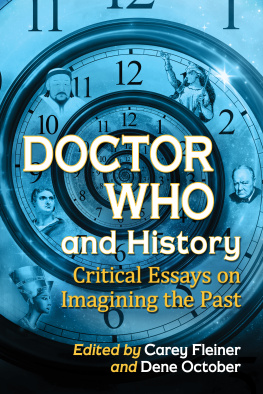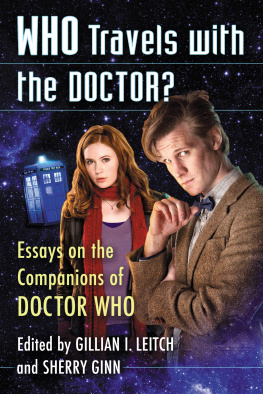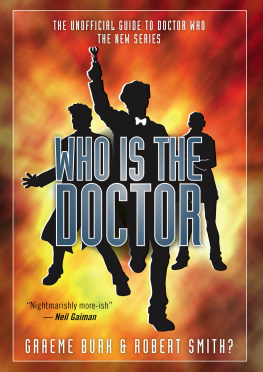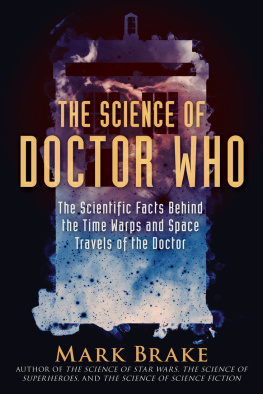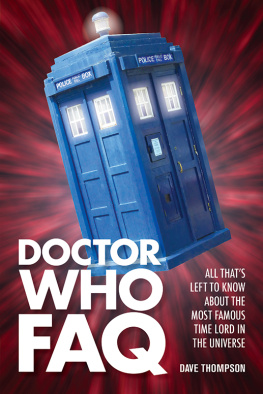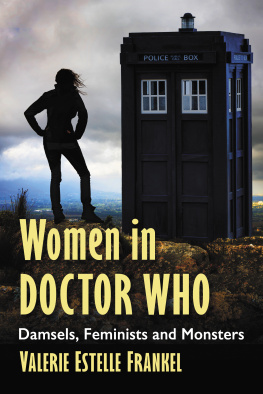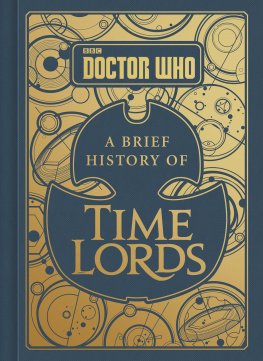
Doctor Who and History
Critical Essays on Imagining the Past
Edited by CAREY FLEINER
and DENE OCTOBER

McFarland & Company, Inc., Publishers
Jefferson, North Carolina
LIBRARY OF CONGRESS CATALOGUING DATA ARE AVAILABLE
BRITISH LIBRARY CATALOGUING DATA ARE AVAILABLE
e-ISBN: 978-1-4766-2981-0
2017 Carey Fleiner and Dene October. All rights reserved
No part of this book may be reproduced or transmitted in any form or by any means, electronic or mechanical, including photocopying or recording, or by any information storage and retrieval system, without permission in writing from the publisher.
Front cover images of Kublai Khan, Queen Boudicca, Nero, Winston Churchill and Nefertiti 2017 iStock
McFarland & Company, Inc., Publishers
Box 611, Jefferson, North Carolina 28640
www.mcfarlandpub.com
Acknowledgments
Like Barbara Wright and Ian Chesterton, we two are putting our feet up having enjoyed many enjoyable adventures historical. We have many people to celebrate, those who helped with the long research sojourns in ancient Cathay and Rome (the focus of our respective essays) and those who offered their support and wisdom, who took our travels seriously and assisted in bringing this collection to fruition.
Thanks to our contributors, of course, without whom we wouldnt have such a diverse and exciting bunch of essays to share. And to the many more who wished to contribute, and who submitted abstractswe received far too many to use in a single volume, for we could only choose a dozen out of the five dozen or so proposals we received.
A special shout out also to James Jordan at the University of Southampton, who worked closely with us at the outset, offering ideas, and helping to hammer out the proposal. Thanks also to the anonymous reviewers whose quiet diligence gave us cause to revise our thoughts.
Thanks go to those archives and libraries who allowed us access to their Doctor Who holdings and answered our many queries and requests, including the folk at the awesome BBC Written Archives Centre in Caversham, England. Thanks also to those in our respective university research departments and libraries for your skills and services.
To our teaching colleagues at the University of the Arts London and the University of Winchesterthanks to all for your support and understanding, and especially for standing in for us while we got to spend study leave in the TARDIS. Although we werent gone too long, we could perhaps have learned from Barbara and Ians error, and arranged to arrive back at the precise moment we left. You live and, thankfully, you learn.
Finally, enormous thanks to the Doctor, without whom there may never have been any inspiration to time-travel. Doctor, you dont just observe the past for us, you make it happen.
Introduction
Historians, writes Penelope J. Corfield, are often asked: what is the use or relevance of studying History? Her reply, that the study of the past is essential for rooting people in time, could have been written with Doctor Who in mind. While some lack a sense of their history, for others the inherited legacy may even be too powerful and outright oppressive (Corfield n.d.). So it is with the central character of the show, whose own past and mythos is itself long and winding, part of broader broadcast history and fan folklore; his lives not only cross paths with historical characters but also the line between fact and fiction. Through such a figure we might learn a great deal about history, and how we approach it. These are issues we seek to explore in Doctor Who and History.
Fifty years after its initial transmission on the BBC, Doctor Who has become part of the cultural history of Britain itself, and its many stories have played out across the medium of television, audio plays and books. Whether set in the past or populated with the inevitable bug-eyed monsters, these adventures in time and space have engaged with important contemporary and historical issues and events. While many recent publications have celebrated the shows longevity, or reflected on the program as a product of the BBC as British institution, Doctor Who and History is the first volume of essays to focus on the topic of history as it is expressed thematically in the show itself, as well as how its program-makers and audience are situated within that history. The diverse essays here promote a scholarly and interdisciplinary approach, exploring how Doctor Who reflects on and contributes to notions of history.
The story of the Doctors character development is well-documented; he is a mysterious being traveling through the past, future, and sideways in his TARDIS, a time machine stuck in the shape of a British police phone box, itself now an icon of post-war London but one the Metropolitan Police thankfully failed to trademark. In addition to his young granddaughter, the Doctor initially travels with a pair of comprehensive schoolteachers, science instructor Ian Chesterton and history teacher Barbara Wright. BBC Head of Drama Sydney Newman and Doctor Who producer Verity Lambert envisioned the show as being, in former BBC Director-General John Reiths terms, something that would educate, inform, and entertain especially in terms of science and history (Tulloch and Alvardo 1983, 4243). During William Hartnells tenure especially the show presented what were referred to in-house as adventures-historical and are now referred to as pure historicals, that is, stories which take place during a particular historical event with no science fiction elements or anachronisms aside from those brought by the Doctor and his companions (1964s The Reign of Terror being one example). Sydney Newman also insisted that the four travelers in the TARDIS would only observe history rather than act as agents of it and possibly become the source of myth. Newman was particularly sensitive concerning the direction of the show, and his penciled comments on early drafts and promotional material reveal this insistence. For example, he criticized an early proposal that suggests the Doctor was an impish time traveler whose meddling perhaps became the basis for the Tooth Fairy or Jacob Marley. On this in-house memo, he commented that such ideas were silly and condescending it doesnt get across the basis of teaching or educational experiencedrama based upon and stemming from factual material and scientific phenomenon and actual social history of past and future. The Doctor has, consequently, observed quite a bit of Earths history over the course of the program: hes seen the origins of life on the planet (e.g., City of Death, 1977), witnessed the destruction of the Earth (End of the World, 2005) and discovered the source of the meteor that destroyed the dinosaurs (Earthshock, 1982). Sometimes, his interference is accidental: we learn, for example, that he caused the Great Fire of London in 1666 in his haste to escape the locals after hes saved them from a Terileptil invasion (The Visitation, 1982). Despite Newmans initiative, from quite early on, the Doctor has been quite pleased to discover that his presence has influenced historical events: in The Romans (1965), he realizes that Nero was inspired to set Rome aflame after seeing the Doctor burn a map of the city; in the same serial, he brags to companion Vicki that he gave Hans Christian Anderson the idea for The Emperors New Clothes. Vicki herself becomes the basis for the myth of Troilus and Cressida when she stays behind at the end of 1965s The Myth Makersand the
Next page
